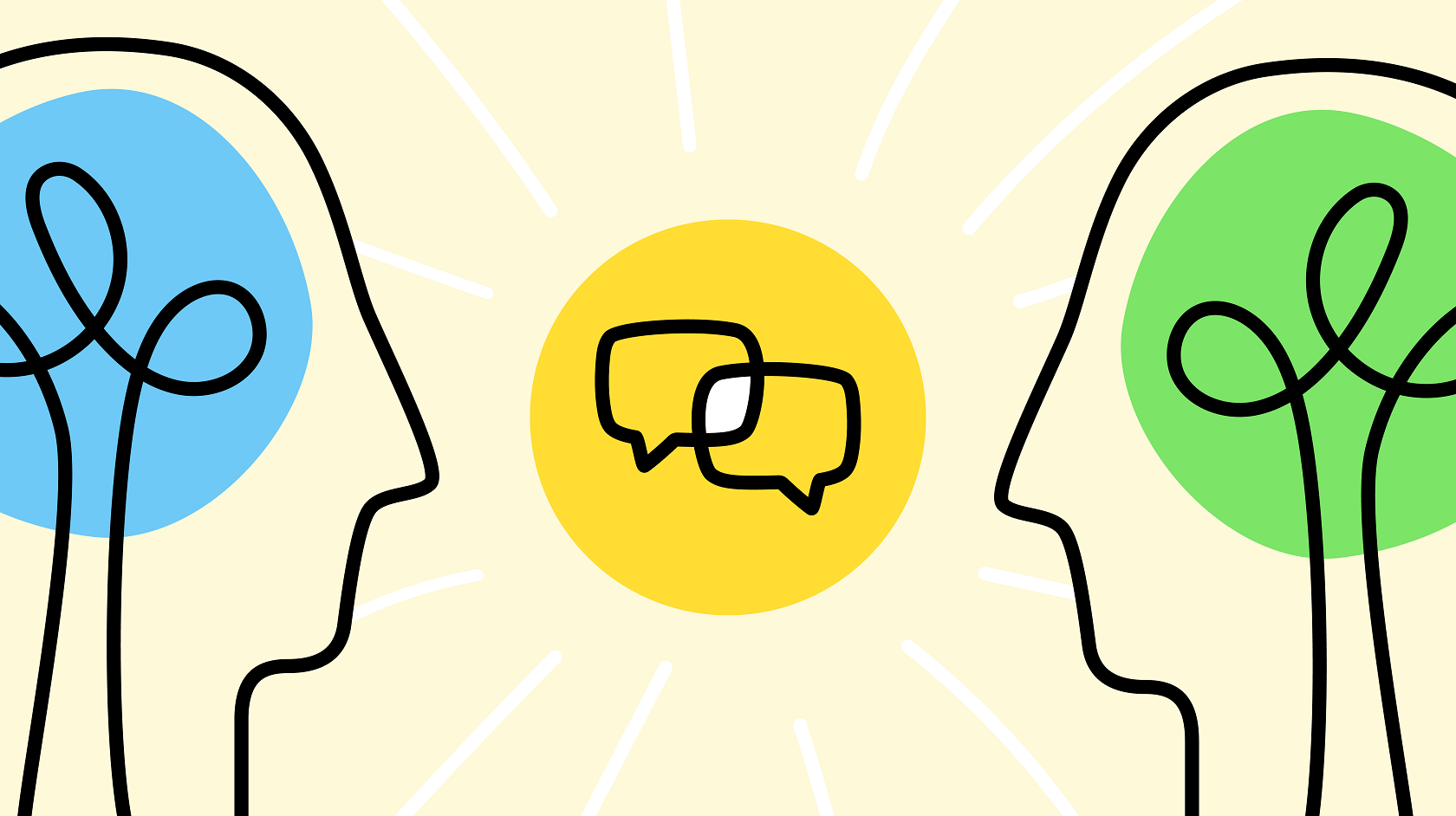8 min read

Collaboration is all about bringing people together from different departments, locations, and teams, then focusing their efforts on a common goal. But it can’t happen unless everyone’s on the same page, skill-wise. Collaboration is a process, but collaborating well is a skill that’s honed over time.
Now, you can try to hire for “collaboration skills”, but if the conditions for a collaborative environment aren’t already in place, collaboration can’t thrive. In this article we’ll take a look at some of the skills needed to effectively collaborate, and what leaders can do to create the conditions for collaboration and help people refine their skills.
Collaboration is super important in the workplace for a bunch of reasons. First of all, it helps everyone work better and faster. When we all work together, we can use our different skills and knowledge to tackle tough tasks and projects. By sharing ideas and dividing the work, we can get more done in less time, which is great for the company.
Plus, working together creates a super positive and inclusive environment. When we all collaborate, we break down barriers between departments and encourage teamwork. This makes it easier to share knowledge and ideas, and helps us all get along better. Collaboration means we all work together, talk openly, and support each other, which makes us feel like we're all on the same team. This is great for employee morale and making people want to stick around.
And that's not all - collaboration also helps us learn and innovate. When we all work together, we get to hear a bunch of different perspectives and ideas, which can spark some really cool new thinking. By pooling our knowledge and experience, we can come up with new ways to solve problems and be more innovative. Collaboration also means we can give each other feedback and learn from each other's successes and mistakes, which helps us all grow and learn new things.
So, bottom line: collaboration is key to making the workplace more productive, positive, and innovative. When we all work together, we can use our strengths to achieve our shared goals and help the company succeed.
Collaboration skills are about working well with others and achieving a common goal. It's more than just finishing a project with a group of people though. It also means building relationships with your team, resolving conflicts, and creating a work environment where everyone feels included and respected.
In the workplace, collaboration skills can include updating your manager and getting feedback, recognizing the hard work of others, suggesting ways to improve group processes, diffusing tension among team members, and promoting inclusivity so that everyone feels respected.
Someone who's good at collaborating has skills like being an influential team member, communicating well, making decisions, and leading.
One of the most important aspects of collaborating well is being open to and accepting of new ideas. When people get in that meeting room to discuss a project, each coming from a different perspective and area of expertise, there’s inevitably going to be a flurry of ideas on the table about how to proceed—ideas that’ll be unfamiliar, new, exciting, and possibly difficult to understand.
People who are naturally curious will thrive in this kind of environment, but those who are a little more resistant to new ideas could potentially stall or otherwise disrupt the project before it even gets started. And because curiosity and open-mindedness are among the fundamental building blocks of collaboration, leaders will need to find ways to encourage them in their people. Writing in Psychology Today, Todd Kashdan recommends the following:
“Begin meetings with a reminder of what type of climate is ideal for courageous and creative ideas to emerge. When ideas are in their infancy, search for what is interesting and ask questions. They can be tough questions, as long as they arise from the desire to gain knowledge (curiosity) as opposed to the need to exert control or dominance (power), or the need to impress others with your ability to outsmart others (social status).”
Another thing you can do to encourage acceptance to new ideas is to set up some parameters on what will be discussed in a given meeting or discussion. For example, if your project is in need of a brainstorm session, make it clear that all ideas are on the table before any one idea can be shot down or picked apart. That way, all ideas will have equal opportunity to be heard, mulled over, and criticized or expanded upon. Formalizing this process will gradually refine one of the key skills for effective collaboration.

Clear and thoughtful communication is another must-have for successful collaboration. Your people will need to be able to express themselves to each other. The problem is, people communicate differently. Some of us feel perfectly comfortable speaking in groups; others don’t. And fostering clear and open communication means being mindful of different communication styles and adapting the way you communicate accordingly.
As Kip Kelly explains: “Effective communication requires a substantial level of self-awareness. Employees must understand their own preferences for how they approach a collaborative situation.”
Because collaboration typically has a social component—getting in meeting rooms and hashing things out—leaders (and everyone else on a team) need to be aware that members of the project team might not feel comfortable speaking up. Here’s what you can do:
Fostering a collaborative environment means making room for all types of communication and communicators. Your collaborative process should incorporate alternative way of communicating, otherwise your most outspoken people will steal the show. Helping people improve their communication skills is difficult, but it can be done once they feel more comfortable.
Collaboration can’t be successful unless people are able to delegate workload, take care of their responsibilities, and keep themselves organized—and that’s why organization is another crucial collaboration skill. Ideally, this isn’t a skill that you’ll need to teach your people (assuming of course you’ve made an effort to hire organized people). But sometimes things don’t turn out as planned.
Leaders can train people to be more organized by making collaboration a part of everyone’s everyday routine. If your people are regularly having to coordinate project responsibilities with each other, the odds are they’re going to learn pretty quickly how to organize their time and workload, especially if it impacts their colleagues’ work on the same project.
Another extremely important component of collaboration is being able to think long-term and envision the end-result of your collaborative work. Collaboration is all about working towards a common goal or shared purpose and recognizing how your contributions fit into that goal. For employees who want to improve their collaboration skills, this means gaining an understanding of a project’s scope and everyone’s role in it. The more you know about the focus of a given project, the better equipped you’ll be to make it happen. For leaders, you’ll need to adequately explain the “why” of a project. Here’s Kip Kelly again to explain:
“The best way to get employees invested in the collaborative process is to give them an opportunity to contribute to a shared vision and purpose. This is about taking the time to articulate the “why” to everyone involved in the collaborative process on a particular project or initiative. Leaders must ensure that all employees understand how their work contributes to the goals of the team and organization and how collaboration will help them meet their goals. When employees understand their broader purpose, they can make more meaningful contributions to their teams.”
Let’s face it: collaborative projects often don’t go as planned. Priorities shift, obstacles delay progress, and problems occur, catapulting the whole project into complete disarray—all of which might tempt us to throw up our hands and walk away. Of course, that’s typically not an option in the workplace. To persevere, people will need to be able to adapt at a moment’s notice.
Adaptability is a crucial collaboration skill, but it’s another one of those difficult-to-teach ones. Adapting well to change comes with practice and experience. My advice here is to lead by example. Did things go completely haywire? Did some unforeseen issue delay all progress on an important project? Your best bet is to keep calm and focus on what the next steps are. Encourage adaptability by skipping the initial freak-out stage and brainstorm a solution to the problem. You’re a calm, cool, and collected collaborator, right? Right.
Another skill that’ll make you a more effective collaborator is being able to tactfully and productively debate ideas with your colleagues (without taking it too personally). When you’re in the meeting room with your project team, debate is often the driver of innovation: good ideas take precedence, not-as-good ideas take a backseat, and the project moves forward. But debating well can be very difficult, especially if you’re emotionally attached to your argument.
For leaders, this means establishing a collaborative environment where friendly, constructive debate is encouraged and, if necessary, regulated. Again, this doesn’t necessarily have to be verbal, in-person debate (but that’ll likely be one component). You could create a discussion or chat channel in which people can hash out why the project requires X. The point is to ensure that the debate is always: on task, productive, polite.
Doing so will improve your people’s ability to provide constructive criticism, move ideas forward, and make collaboration happen.
Creating an environment where collaboration thrives means anticipating how collaboration might break down, and taking action to prevent it before it happens. A truly collaborative workplace is one where everyone throughout the organization has a voice, is on equal footing, and is able to contribute their abilities and skills to the project at hand. To infuse collaboration into your organization’s culture, concentrate on nurturing your people’s collaboration skills.
Read more by
Corey Moseley
Jostle’s employee success platform is where everyone connects, communicates, and celebrates at work. Find out more at jostle.me. © 2009–2026 Jostle Corporation. All rights reserved.